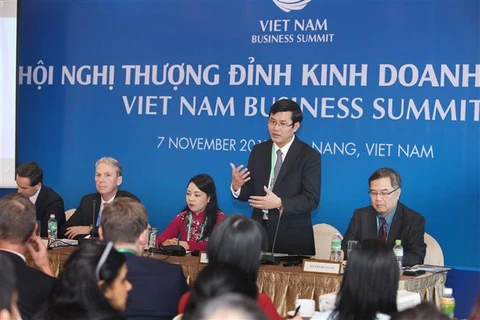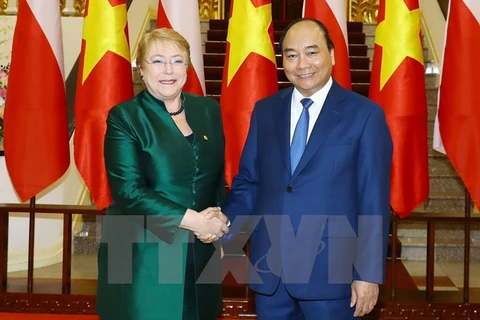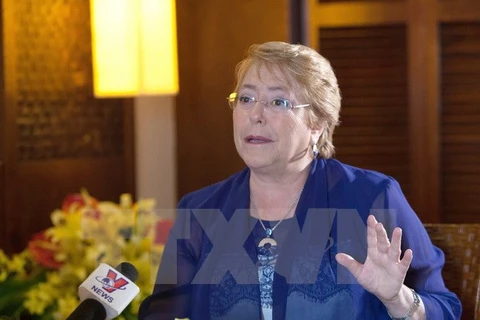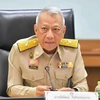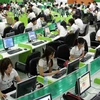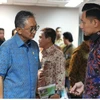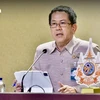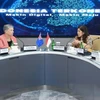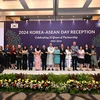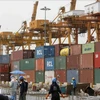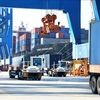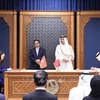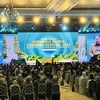Hanoi (VNA) – The digital economy and services, regional connectivity, and growth in women’s roles will be the priority topics in the Asia-Pacific Economic Cooperation (APEC) meetings in Chile in 2019.
Rodrigo Yanez, General Director of International Economic Relations at Chile's Ministry of Foreign Affairs, said at a press meeting on July 11 that the country, as the APEC host, has "a great opportunity to lead and set the regional agenda in terms of a smoother flow for commerce."
The agenda allows them to define the substantive areas of work in accordance with Chile’s commercial policy strategy, especially in relation to its priorities in terms of economic possibilities and sustainable growth, he said.
He added that the digital economy and services will be focused on finding the best regulatory practices. This is meant to encourage capacity for an inclusive digital economy, to improve statistical conditions, as well as consumer confidence rates in the use of digital tools, and reach a level where people are able to do their jobs using new technologies.
Regional connectivity will help establish more fluid, dynamic, and inclusive commerce, the official said, adding that, "boosting development in widespread connectivity will allow us to respond to the new needs of the market and promote the integration of small- and medium-sized companies into the global market."
The theme of women and economic growth will be brought up for the first time as an APEC priority.
Yanez said, "We look to increase the participation of women in the economy and international commerce as a source of economic growth and reduction in gender pay gaps."
It is expected that about 20,000 delegates from 21 APEC economies will participate in more than 200 meetings in 2019, according to the Chilean foreign ministry.
Founded in 1989, APEC is the Asia Pacific’s premier economic forum, comprising of 21 economies, namely Australia, Brunei, Canada, Chile, China, Hong Kong, Indonesia, Japan, the Republic of Korea, Malaysia, Mexico, New Zealand, Papua New Guinea, Peru, the Philippines, Russia, Singapore, Taiwan, Thailand, the US, and Vietnam. -VNA
Rodrigo Yanez, General Director of International Economic Relations at Chile's Ministry of Foreign Affairs, said at a press meeting on July 11 that the country, as the APEC host, has "a great opportunity to lead and set the regional agenda in terms of a smoother flow for commerce."
The agenda allows them to define the substantive areas of work in accordance with Chile’s commercial policy strategy, especially in relation to its priorities in terms of economic possibilities and sustainable growth, he said.
He added that the digital economy and services will be focused on finding the best regulatory practices. This is meant to encourage capacity for an inclusive digital economy, to improve statistical conditions, as well as consumer confidence rates in the use of digital tools, and reach a level where people are able to do their jobs using new technologies.
Regional connectivity will help establish more fluid, dynamic, and inclusive commerce, the official said, adding that, "boosting development in widespread connectivity will allow us to respond to the new needs of the market and promote the integration of small- and medium-sized companies into the global market."
The theme of women and economic growth will be brought up for the first time as an APEC priority.
Yanez said, "We look to increase the participation of women in the economy and international commerce as a source of economic growth and reduction in gender pay gaps."
It is expected that about 20,000 delegates from 21 APEC economies will participate in more than 200 meetings in 2019, according to the Chilean foreign ministry.
Founded in 1989, APEC is the Asia Pacific’s premier economic forum, comprising of 21 economies, namely Australia, Brunei, Canada, Chile, China, Hong Kong, Indonesia, Japan, the Republic of Korea, Malaysia, Mexico, New Zealand, Papua New Guinea, Peru, the Philippines, Russia, Singapore, Taiwan, Thailand, the US, and Vietnam. -VNA
VNA
